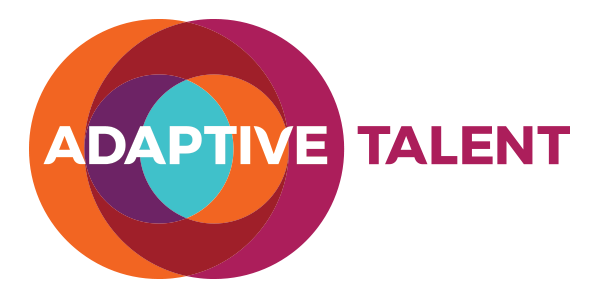Quartz at Work just posted an article about the coming wave of employee turnover that is expected as the pandemic winds down. My partner Mark McEachran leads Adaptive Talent’s Retained and Executive Search practice and recently told me he’s never seen so many candidates with multiple job opportunities. I’ve quoted the article below but my advice continues to be to invest in your employees’ capabilities and connection to their peers, manager, and company or risk turnover and execution and adaptability challenges. When employees perceive that upward mobility is the only marker of career momentum, you’ve set yourself up for a big problem.
Instead, emphasize deliberate development that is mapped strongly to the goals of the company, functions, teams, etc. Engage your team to identify potential new products and service lines, or opportunities to retool processes for greater efficiency. Socialize continuous development by having employees share their developmental focus with peers, enlisting their support, and ensure managers and executives do the same. Project teams and rotational programs are an easy way to expose people to different parts of your business and provide a tangible sense of development and contribution. Your business will end up being more adaptable, your employees will grow their business acumen and leadership capacity, and you should end up lowering or delaying turnover.
“If recent polls are accurate, workers around the world are going to launch an epic game of musical chairs once offices open again and mass vaccinations bring the pandemic under control. Compared to average numbers before the pandemic, far more employees are yearning for a new job and plan to make a move imminently.
More than 40% percent of people who responded to Microsoft’s Work Trend Index, a global survey of more than 30,000 people in 31 countries, said they are considering leaving their employer this year. Prudential’s Pulse of the American Worker survey found that 25% of US employees expect to look for a new employer “once the threat of the pandemic has decreased.” In a smaller survey, the Toronto-based recognition software company Achievers discovered that 52% of North American workers were planning to look for a new position in 2021. For reference, before the pandemic, the average voluntary turnover rate across US industries was about 15%, according to Mercer, a benefits consulting company.
So, what’s going on?
A sense of “languishing” is widespread
A recent New York Times article by Wharton organizational psychologist Adam Grant hints at one major theme: Grant asserts that more people are in a state of “languishing” because of the pandemic and its constraints. Languishing sits between depression and flourishing; it zaps your motivation and ability to focus. “It feels as if you’re muddling through your days, looking at your life through a foggy windshield,” Grant explained. “And it might be the dominant emotion of 2021.”
Certainly, Prudential’s research suggests that people who are planning to look for a new job would relate to the feeling of being stuck. Among the quarter of total respondents who said they plan to job hop, 80% said they’re concerned about their career growth.
The pandemic has led to a “very real experience that employees have had around a lack of career progression, and a concern around skills development,” says Rob Falzon, vice chair at Prudential. People feel “that they’ve been working very hard, but they’re not really seeing opportunities to progress,” he adds, partially because companies have been understandably distracted by more urgent needs related to surviving the pandemic and keeping people safe.
The pressure to keep skills fresh amid all the automation
Prudential’s research also found that 72% of people who want to find a new job are worried about their skill set, compared to 46% of employees overall. The restrictions imposed by quarantines and lockdowns appear to have pushed companies to adapt automation and other forms of smart technology at a faster pace than previously anticipated. Employees may now be thinking, “I need to stay mobile because I’ve got to keep my skills fresh, and what I’m doing today is not going to make me ready for the marketplace of tomorrow,” Falzon proposes.
But he also blames a “disassociation” from company culture for the spike of interest in job-hunting. Through a year of remote work, many people have remained intensely connected to the colleagues they need to converse with daily, but they’re often missing out on the second or third ring of workplace associates (or what organizational consultants call “loose ties”), Falzon argues. When we’re not grabbing lunch with people, or checking in with a wide group of peers on a regular basis, “we’re not getting that broader exposure to the organization,” he says, and that makes people more open to picking up a call from a headhunter now than they were before “because they’re feeling a little less emotionally attached.”
In fact, a recent University of Houston study did find that job satisfaction is more connected to the people you work with than your interest in the role itself. As long as you don’t hate what you’re doing day-to-day, having positive relationships with your peers appears to be a better indicator of how content you’ll be to stick around.
A dissatisfaction with leadership in the pandemic
Microsoft’s research team attributes the coming wave of job-changing to dissatisfaction with leadership teams and the ways in which they have lost touch with the experiences of employees.
Specifically, Gen Z workers, from the generation most likely to say they plan to seek a new employer, said they have had a hard time networking, introducing new ideas, squeezing in a word of conversation at meetings, and feeling motivated. Others are looking for better work-life balance; workers, and working parents in particular, reported feeling exhausted, while 37% of all global respondents indicated that their companies were asking too much of them during a difficult period. Business leaders, on the other hand, were found to be “thriving.”
To be sure, the past year has many people feeling literally stir-crazy and ready to shake things up in realms outside of work too, at least anecdotally. But with work dominating most people’s time, workplace value and demands are coming under special scrutiny. “I want every day to count for something at work or else I’m changing my role,” was one of the resolutions listed in a viral LinkedIn update by a British man who, after surviving a heart attack, drafted a new set of rules for life and shared them online. (His first thought when the chest pain arrived was that its timing was inconvenient because it clashed with a meeting he had scheduled.) That sentiment, that every day at work must mean something more now, has taken hold in plenty of people who have not recently cheated death.
Where will the new jobs be found?
All the work-related wanderlust raises another question: Where are all these job hunters going to find new roles? In the US, at least, the labor market has not fully recovered, nor evenly recovered, with more jobs being added in professional and business services while the hospitality and leisure industries remain devastated. (The EU workforce saw far fewer job losses.)
“I think you will see some more increased mobility of talent,” says Falzon. But employers can fight back by focusing on injecting new life into company culture (especially as businesses go hybrid), prioritizing employee interests like career growth, and finding the connection between a company’s mission and the deeper values of today’s socially conscious employees, Falzon adds. “Smart companies will get ahead of this,” he says.”
—
Adaptive Talent is a talent consultancy designed to help organizations achieve amazing results and ongoing adaptability. Founded in 2008 and based in Vancouver, Canada we offer retained and executive search, assessments, total rewards consulting, training, leadership coaching and development programs, and culture & organizational development consulting.

